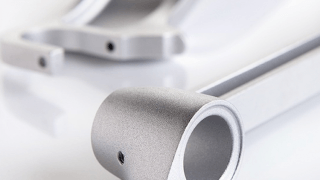
Why more sectors are choosing aluminium alloy parts from Investacast
Aluminium is widely used in casting thanks to its high strength, low weight, superior conductivity, and resistance to harsh environments. Investacast supplies aluminium casting to a wide range of industry sectors, including Aerospace, Automotive and Electronics.
In this blog we take a closer look at aluminium and the alloys best suited to your needs.
What is aluminium?
Aluminium is the most widespread metal on Earth, and the third most common chemical element on our planet after oxygen and silicon. Pure aluminium is not found in nature because it binds easily with other elements – it is most often found as aluminium sulphates which are processed by electrolysis or electrolytic reduction to produce pure aluminium.
Why is aluminium great for casting parts?
Aluminium has many properties that make it ideal for manufacturing parts for a wide range of industries.
- Lightweight: Aluminium is one of the lightest metals in the world, almost three times lighter than iron. Many sectors now demand lighter parts to help reduce fuel consumption, whether in sectors such as space or aviation, or more generally to economise on transport costs. For example, thin-walled investment castings and high strength aluminium forgings now replace heavier steel pressings in commercial passenger aircraft.
- Strong: Aluminium has a good strength-to-weight ratio. Aluminium alloys are a third of the density of steel, but investment cast aluminium alloys can achieve two thirds (and forged aluminium alloys can equal) the mechanical strength of mild steel.
- Ductile: aluminium is naturally pliable and even after alloying can be heated to improve this ductility for forging quite large components.
- Corrosion resistant: thanks to a permanent, thin surface layer of aluminium oxide, this metal is highly resistant to damaging corrosion. A variety of surface finishes can be chosen to further enhance corrosion resistance.
- Heat conducting: aluminium conducts heat effectively and is used extensively for heat sinks in lighting and electronics.
Aluminium Alloys
Aluminium easily forms alloys with almost all other metals, making it extremely versatile. For example, when alloyed with elements such as Silicon, Magnesium and Copper it can be used to make products which can be as thin as 1mm but have two thirds the mechanical strength of mild steel.
A variety of aluminium alloys have been formulated and developed to suit the different manufacturing processes carried out at Investacast.
- Sand, Investment and Gravity Die casting: alloys developed for these processes are largely interchangeable. These alloys include LM25, A356, LM6 and LM4.
- Pressure Die casting: the most frequently used alloys are ADC12 and A380. Alloys LM25, LM6 and LM4 can also be cast.
- Forging: where parts require higher strengths than those attainable through the casting processes, the 6 series alloys are suitable for forging. For ultimate high strength, 7075 grade is the alloy of choice.
Eco-friendly aluminium
Aluminium and its alloys can be melted down and reused without any detriment to its mechanical properties. This makes it is one of the least damaging materials to the environment. At Investacast our casting and forging processes produce very little waste, and we take every care to ensure that excess aluminium is recycled and reused.
Choose Investacast for your cast and forged aluminium parts
If you are looking for forged or cast aluminium parts and components, Investacast has the expertise to deliver high quality products for a broad range of sectors. Whether your demand is for high volume automotive products at 100,000 parts per year, or smaller more complex Investment cast parts for electronics projects at 100 per year, Investacast is the right partner.
Contact our expert team on +44 (0) 1271 866200 or email [email protected] for more information.